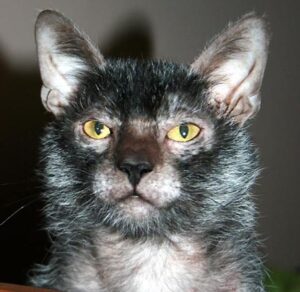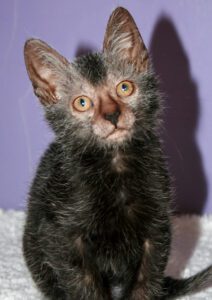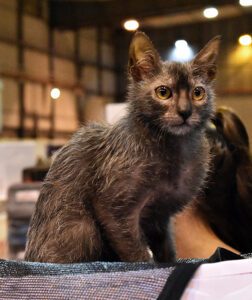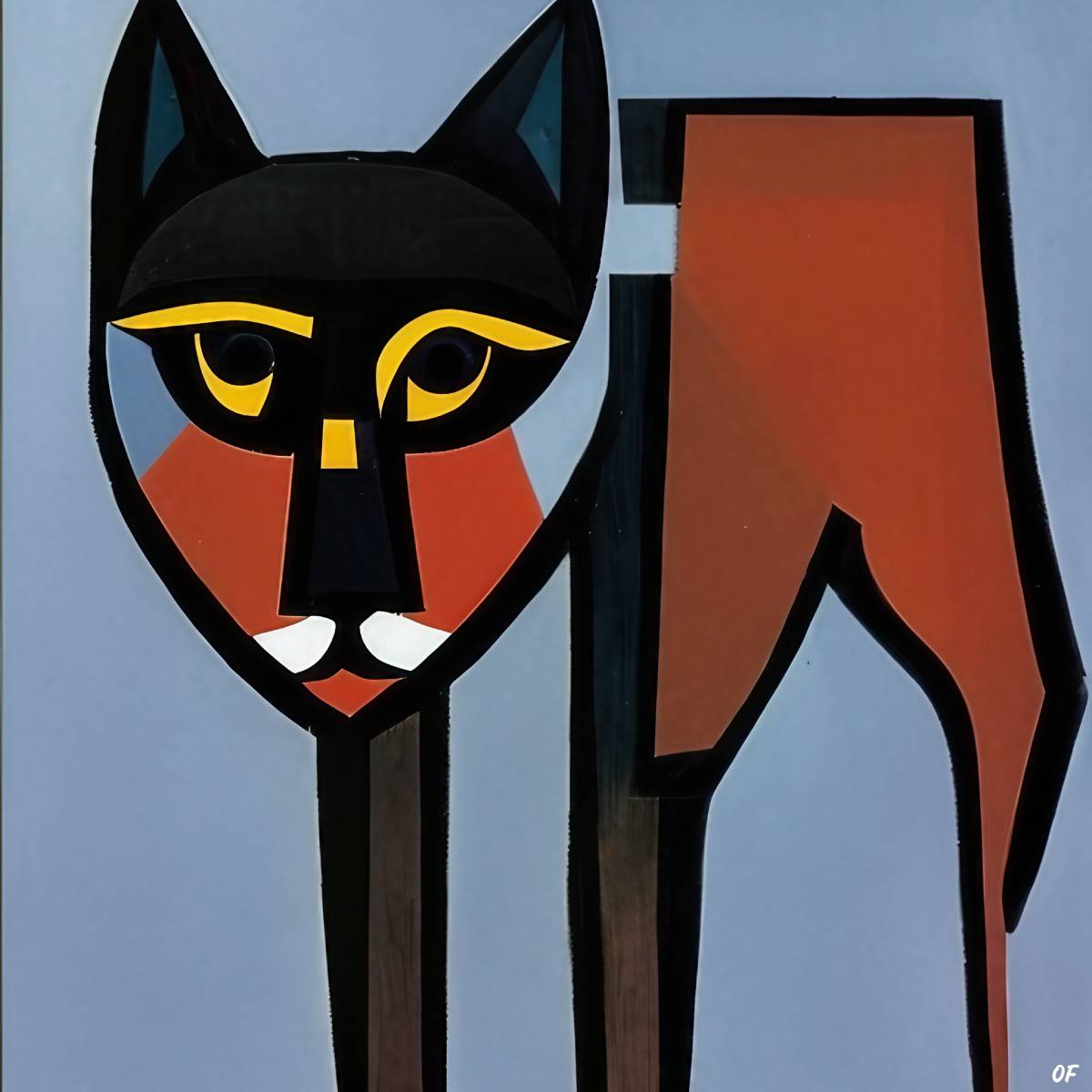There are certain kinds of animals that are so bizarre and unique you’ve got to see them to believe they even exist.
The zunzuncito, for example, is a bee-sized hummingbird that is so pearlescent you might mistake it for a minuscule jewel. The Peruvian Inca Orchid, despite its misleading name, isn’t a flower at all, but a hairless dog that likes flowers—more specifically, orchids. And the penis snake is… well, you can probably guess what that is.
But believe it or not, those are all real animals. As is the wolf cat.
Shapeshifting feral cats: the birth of the werewolf cat
The story of the wolf cat begins in July 2010, when a veterinarian by the name of Patti Thomas came across a few strange-looking feral cats at a rescue center in Virginia. They were presented to her as sickly Sphynx cats, but Thomas knew right away that they were neither Sphynx nor sick. She confirmed her initial suspicions shortly after by doing a DNA test for the Devon/Sphynx gene—which neither of the kittens had!
Intrigued by her discovery, Thomas contacted her Tennessee-based colleague Johnny Gobble. As he and his wife Brittney were testing the kittens for possible disease or a skin abnormality, a second litter of similarly looking, partially hairless cats appeared. Now, there was an easy way for the Gobbles and Thomas to see if the cat’s appearance was due to a disease or a natural genetic mutation.
They bred the two unrelated litters in the summer months of 2011. What came out was the first litter of Lykoi kittens in all of recorded history. It was Patti’s idea to name them that. “She said Lykoi was the Greek word for wolf,” Gobble remembers, “and we all thought it was very fitting—Lykoi, the ‘wolf cat.'”
Introducing Lykoi Cats: facts and findings
No more than a few glances are enough to agree that Lykoi is quite a fitting name for this new breed of cat. They, indeed, look like a werewolf mid-transformation—or, rather, like a witch’s dream pet!
The fact that they look scary, however, doesn’t mean they actually are: on the contrary, werewolf cats are quite gentle and loving creatures. Not only do they bond well with humans and are a loyal breed, but they are also quite tolerant of other animals, even dogs!
Without further ado, here are a few more things to know about wolf cats, one of the newest—and strangest—cat breeds!
Appearance

The Lykoi cat breed is medium-sized and athletic, with striking physical features. The most notable among them is, of course, the short, sparse fur, which is often patchy or balding in areas—and resembles that of a wild wolf much more than it resembles that of a domestic cat.
Moreover, Lykoi cats have a distinctively wolf-like face, almost hairless in the middle, with large, pointed ears and a narrow muzzle. Their eyes are big and almond-shaped, and they come in a variety of colors, most notably amber and green.
It is a misconception that wolf cats are born naked and/or are hypoallergenic. Quite conversely, each Lykoi kitten is born with a full hair coat, which they start to lose around one or two weeks of age. They are also heavy shredders, so they can often become completely bald before their fur starts growing back again. And it’s all because of a simple genetic mutation.
Genetics
As they are a very recent cat breed, almost everything we know about wolf cats comes from no more than a few studies. One of these, published as recently as 2020, discovered that Lykoi cats owe their distinctively spooky looks to a specific kind of congenital deficiency called hypotrichia.
To use the explanation of Mr. Gobble—one of the wolf cat founders and its foremost expert—hypotrichia means that some hair follicles in wolf cats lack “all the necessary components required to create hair;” this is why, uniquely, Lykoi cats lack an undercoat.
In addition, the follicles that are able to produce hair in a Lykoi cat somehow lack the proper balance of components to maintain that hair, which is why Lykoi both molt and are prone to losing their entire hair coat from time to time.
But make no mistake—much like any other house cats, they are quite proud of their appearance. Or, at least, look like they are.
Behavior and temperament

Lykoi are known for being intelligent, playful, and affectionate cats. They are also very active and have a high prey drive, so they need plenty of toys and stimulation to keep them occupied.
Just like dogs—and unlike other cat breeds—the Lykoi love to play fetch and will sometimes bring their toys back to their owners. They are also very loyal and protective, which makes them excellent feline companions!
Health problems
Since they are such a new breed, it’s still unclear which health issues are most common in wolf cats. However, it’s safe to assume that—just like Sphynx cats—they could be prone to respiratory diseases and skin cancer due to their lack of fur and exposed skin.
For the same reason, they are considered exclusively indoor cats and might need a warm bed or a few sweaters in winter.
A rare breed of domestic cats

The Lykoi gene is recessive, meaning both parents must carry the gene for their offspring to inherit it. That’s why wolf cats are so rare—chances are, without the recent human intervention, they would have been easily swept away into nonexistence by inbreeding and natural selection.
Hence, though some Lykoi Cats are still born in feral cat colonies, the vast majority owe their existence to human breeders and the original breeding program, which circumvented inbreeding issues by outcrossing with shorthair black cats, as the mother of the first litter was a regular domestic cat.
According to the International Cat Association (TICA)—which recognized the Lykoi breed as a championship breed in 2017—there are currently no more than ten wolf cat breeders in the world. TICA also claims that there are less than 100 show-standard wolf cats in existence. A show-standard Lykoi cat is black roan only. Other colors (which pop up from time to time in the feral population) are not allowed for showing, but they are allowed for breeding.
For this reason, the black roan wolf cat is quite an expensive cat, with the typical wolf cat for sale fetching between $1,500 to $4,500. But, then again, why shouldn’t it be? It’s rare, intelligent, affectionate—and has a wolf’s coat! Also, it’s pretty adorable, in that made-for-Halloween, oh-boy-that’s-so-creepy kind of way. Fans of the spooky and cute cannot go wrong with the Lykoi wolfcat!


